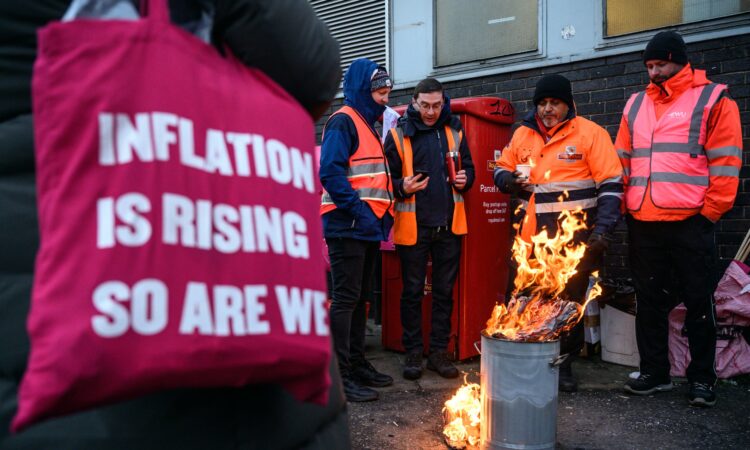
Boosting incomes is the best thing a government can do in recession. Sunak knows this
December 19, 2022 2:20 pm(Updated 3:12 pm)
Once upon a time in Britain trade unions were social partners – meeting with governments and businesses to consult on industrial policy. In Britain this was rarely formalised, but for the first 35 years after the Second World War, governments of all stripes, with varying levels of enthusiasm, recognised trade unions as having an important role in the economy. Since then, however, the Conservatives have declared war on them.
It took the pandemic to see a glimpse of how it used to be in Britain, when the then Chancellor and now Prime Minister Rishi Sunak brought in representatives from business and trade unions to work with civil servants to design the furlough scheme.
At its peak the job retention scheme ensured nearly nine million workers, who may otherwise have been laid off, received 80 per cent of their wages – giving them enough to live and keep the open parts of the economy afloat. It injected £70bn into the economy at the time it was most needed.
So – with our economy on the brink again – it makes sense for the PM and ministers to work with trade unions on a pay deal and put money back in the pockets of workers.
This month an estimated million working days will be lost to industrial action. This upsurge in strikes – from rail workers to nurses, border guards to paramedics, postal workers to university lecturers – is for one very simple reason: people are struggling to make ends meet.
According to the Office for Budget Responsibility (OBR), we are about to enter recession, and that forecast was borne out by grim retail sales figures last week, which showed “compared with the same period a year earlier, retail sales volumes fell by 6.2 per cent in the three months to November 2022”.
The Federation of Small Business has also warned that “many small firms are now worried that they might have to shut their doors for good in a few months, if not weeks” with “near rock-bottom consumer confidence and skyrocketing input costs” causing the problems.
When people’s incomes fall they have less to spend, damaging local businesses and their local high street. As businesses fail – with restaurants and pubs fearing for 2023 alongside retail – then workers are laid off. Unemployment is predicted to rise by more than half a million in the next 18 months.
Consumer confidence and disposable incomes will also be hit by the Bank of England’s absurd decision to raise interest rates, again, as we enter recession. This means many mortgage payers will be spending more not in job-generating local businesses, but in higher monthly payments. Likewise, households with debts or overdrafts will face higher costs meaning less money to spend in local shops.
Boosting incomes is the best thing a government can do in recession. Sunak knows this: when the pandemic lockdowns forced a recession on us, he chose to maintain incomes of those who may otherwise have lost their jobs and boosted Universal Credit by £20 per week. Workers are right to strike for better pay at the moment – not just for their own benefit, but because it’s good for the wider economy too.
More from Opinion
But when it comes to nurses, paramedics and other health workers who will be on strike later this week, another argument applies too. These are the workers who keep us fit and able to work. But in the last few years vacancies in the NHS have ballooned, and last year more nurses left the profession than in any other in recorded history.
Simultaneously, in the last few years more people of working age have been classified as “economically inactive”, with ill-health being the main reason given for inactivity among the over-50s, while poor mental health is primary driver among younger workers, a new study by the Health Foundation shows. The NHS currently has record waiting lists, with 7.2 million patients awaiting treatment. Many of these people will be unable to work, or limited in their work, until they get treatment. Delays and backlogs are costing the economy.
Unless the pay of nurses and paramedics is boosted, NHS managers will find it harder to recruit and retain these workers who are essential in getting others back to work too. More people able to work means more people earning, boosting consumer demand and government tax revenues.
This is a virtuous circle. So if you see a picket line this month or next, thank those people, they’re trying to save the economy.
Andrew Fisher is a former executive director of policy for Labour






